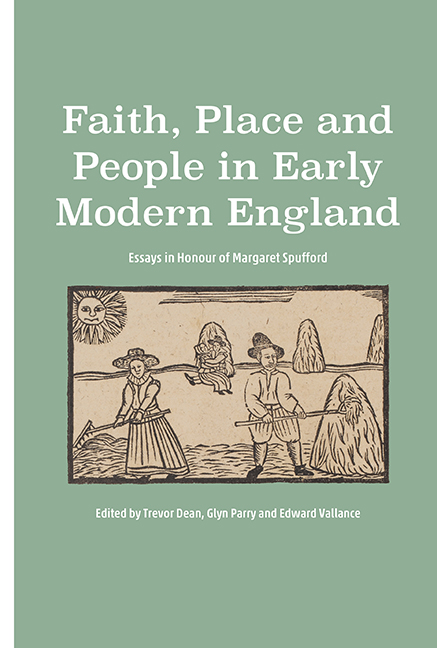Book contents
- Frontmatter
- Dedication
- Contents
- List of Illustrations
- List of Contributors
- Record Office Abbreviations
- Acknowledgements
- Introduction
- Margaret
- Part I Faith
- Part II Place
- Part III People
- 7 ‘Flowered silk is little worn but gold and silver striped is much worn’: Metropolitan Clothing Consumption in Late Seventeenth- Century Sussex
- 8 A Cuckold in Space: The ‘Ballading’ of Stephen Seagar, 1669
- 9 Marginal People in a Stressful Culture: Gypsies and ‘Counterfeit Egyptians’ in Margaret Spufford's England
- Bibliography of Margaret Spufford's works
- Index
- Tabula in Memoriam
9 - Marginal People in a Stressful Culture: Gypsies and ‘Counterfeit Egyptians’ in Margaret Spufford's England
from Part III - People
Published online by Cambridge University Press: 19 July 2019
- Frontmatter
- Dedication
- Contents
- List of Illustrations
- List of Contributors
- Record Office Abbreviations
- Acknowledgements
- Introduction
- Margaret
- Part I Faith
- Part II Place
- Part III People
- 7 ‘Flowered silk is little worn but gold and silver striped is much worn’: Metropolitan Clothing Consumption in Late Seventeenth- Century Sussex
- 8 A Cuckold in Space: The ‘Ballading’ of Stephen Seagar, 1669
- 9 Marginal People in a Stressful Culture: Gypsies and ‘Counterfeit Egyptians’ in Margaret Spufford's England
- Bibliography of Margaret Spufford's works
- Index
- Tabula in Memoriam
Summary
I first heard of Margaret Spufford in my first term of research at Cambridge, when seated in the blue armchairs in the Anderson room in the university library, working though visitation records of the diocese of Ely, looking for schoolteachers. The archivist, Dorothy Owen, whispered loudly in my ear, ‘You do know, don't you, that Margaret Spufford has already gone through these records?’ Spufford, it seemed, might be a colleague or collaborator, perhaps a rival, and she was already ahead of me, as she long remained.
Spufford made her name with Contrasting Communities, which I praised in The American Historical Review. The scholarship she sometimes described as ‘serendipity’ was grounded in the most persistent, attentive and innovative archival research. Her arguments about the importance of soil types and farming practices for variations in social organisation and cultural flexibility were fully supported by the evidence, and where she had doubts she said so.
Over many years Margaret Spufford and I became friends and correspondents, criticising each other's work along with wholesome encouragement. Our most fruitful disagreement concerned the extent of literacy, and the ability of ordinary English men and women to read the output of the popular press. I took a somewhat minimalist position, restricting literacy to perhaps 10 per cent of the women and no more than 40 per cent of the men, while she argued that signature indicators were untrustworthy, and that the ability to read was more widespread. Now that the dust has settled, I think we might agree that literacy was strongly stratified by class, status, occupation, gender and location, while exceptional individuals transcended the constraints of their environment. Print was indeed widely distributed, reaching many on the margins of literacy, but many English villagers remained as benighted as their ministers often said they were.
Spufford's work opened up a third tier of the early modern social experience. The first tier was occupied by the crown and nobility, and the leading members of the so-called political nation. Its historians are legion and talented. The second tier embraced the parish gentry and their clerical and professional associates, who constituted the ‘county community’. Study of their accounts and correspondence has expanded understanding of domestic life and political culture, yet only of the top 2 per cent of the population.
- Type
- Chapter
- Information
- Faith, Place and People in Early Modern EnglandEssays in Honour of Margaret Spufford, pp. 202 - 221Publisher: Boydell & BrewerPrint publication year: 2018



